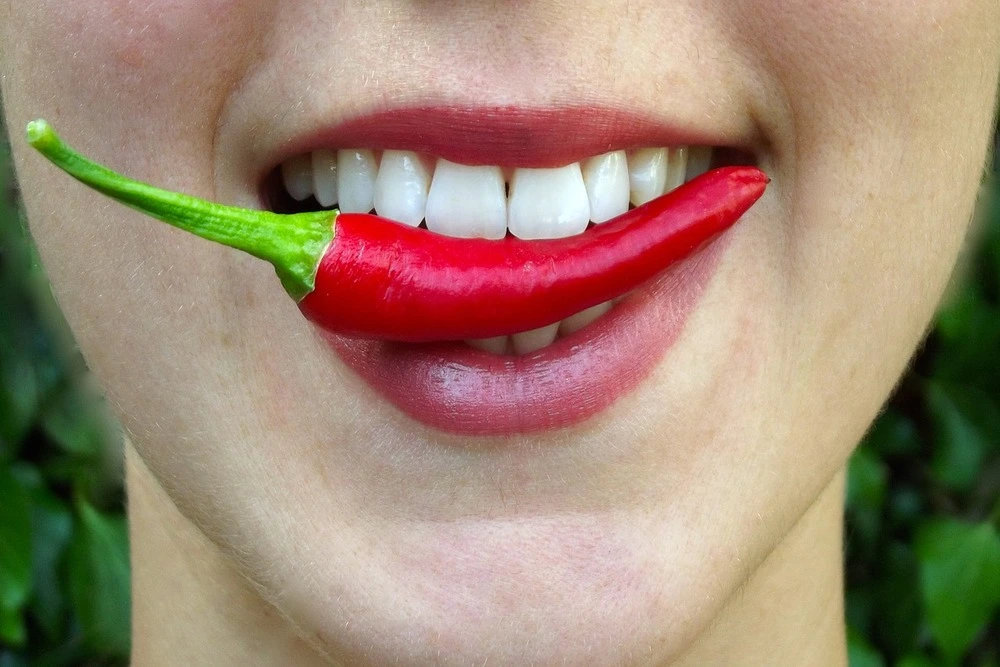It’s better if you avoid spicy food while on your period. When you eat spicy food, you can suffer from bloating. That’s specially so if your period is severe. That means manifesting great fatigue, heavy flow and even cramps.
Can I eat spicy food on my period?
As we said, we recommend to pass it on. However, it doesn’t mean that you have to completely eliminate it. You can still enjoy spicy food now and then. What you have to do is moderate your cravings for spicy food.
Can I eat spicy food before my period?
Sure, you can. There’s nothing to worry about it. Eating spicy food will not alter your menstrual cycle since this is controlled by the hormonal influence and the relationship that various systems have (hypothalamus, pituitary and ovaries), which act synergistically to control hormonal peaks and also the various phases during menstrual cycle:
1. Follicular phase
Proliferation of the endometrium in preparation for implantation.
From day 1 to 13.
2. Ovulation
Ovulation ready for fertilization from day 14 to 16.
3. Luteal phase
Desquamation of the endometrium if there is no fertilization, from day 17 to 28.
What food should I avoid on my period?
When you’re on the menstrual period, the production of estrogens and progesterone decreases, and serotonin levels also decline, the amount of sugar in our blood decreases, but our brain continues to demand it.
As a consequence, this creates the desire for fast-absorbing carbohydrates: refined sugars, processed pastries, pizzas, chocolate, or ice cream. And it is very important that we recognize that we should not eat during menstruation, since, if we let ourselves be carried away by what the body wants, we end up suffering from weight gain during menstruation.
Among the food you have to avoid are:
Fried and sausages
In general, we mean fats. Avoid industrially prepared foods: fried, processed or pre-cooked foods. These are higher in estrogen, which can make your period worse.
This hormone, along with progesterone, is the most important in female metabolism. Small variations in their indices lead to chemical changes in the body that cause headaches, insomnia or irritability.
Undoubtedly, during the period (and on a regular basis) the best you can do is maintain healthy eating patterns: a balanced diet. So we will make the body much better prepared to receive menstruation and all the changes that come with it.
Milk
You should avoid dairy products if you experience constant cramps and abdominal pain. Milk contains lactose, a specific type of sugar that is difficult for some people to digest. In addition, it can cause bloating as stated, stomach aches and nausea, symptoms that you could already be experiencing due to menstruation.
Refined Sugars and pastry
In this phase of the cycle, the female body offers more resistance to insulin. That causes glucose levels to drop. The way the body tries to compensate for this is by increasing our feeling of hunger. It raises the level of anxiety and menstrual cravings, generally for sweet.
Filling up on refined sugars will quickly raise your serotonin and glucose levels. This results in an almost immediate feeling of tranquility and pleasure.
However, this is the worst decision we can make as the body will experience an immediate insulin spike, causing reactive hypoglycemia. That is to say, the sugar levels go back down to the minimum, so we want to eat sweets again and we enter a loop effect.
The solution to this anxiety lies in slow-release carbohydrates. With them you will maintain the stability in your glycemic index. Try whole grains, vegetables, and legumes.
Caffeine
Coffee is not a good companion for menstruation. We may momentarily lift our spirits a bit at some point when we find ourselves more down. In return, we will feel more nervous and they can cause us anxiety.
There are good foods that will help you get this amino acid, a serotonin booster, known as the “happiness hormone.” Its presence in our body allows us to maintain a more positive state of mind, regulates our sleep cycle, appetite or blood pressure and keeps bad moods away. For these moments it is good to know what to eat when you are unwell.
In this case, we can try to capture serotonin thanks to the tryptophan present in eggs, oily fish, avocados, bananas and chocolate. The latter should be taken in moderation since it is generally very fatty. To avoid its fat some people try to consume 100% cocoa, without milk or sugar.
Salt
We all know the swelling is common during menstruation. This is caused by greater fluid retention and a consequent weight gain. In these circumstances, the salt will only help to retain more liquid and, therefore, to enhance the heaviness.
It is very important that you understand that this weight gain will go away in a few days, as the period ends. It is even possible that if you have followed a good diet, you will notice that you have lost weight.
Weight loss and menstruation are compatible. Substitute some spices for the salt. They will give flavor to the food and many of them also have anti-inflammatory properties.
What food should I eat on my period?
There are also some type of food that are really great to ease the symptoms that menstruation brings. Some of them are:
Broccoli
Iron is the mineral that is most lost during menstrual bleeding. So broccoli is essential to compensate for such loss. In addition to that, this food is rich in fiber, magnesium and potassium, which help reduce bloating, adjust digestion and relax muscles if you suffer from any type of cramp.
Ginger
Ginger is good for controlling inflammation, but it will also help reduce menstrual cramps. Add it fresh to your tea or infusion if you suffer from abdominal discomfort.
Salmon
Salmon should be included in any diet that is considered healthy because it contains beneficial omega-3 fatty acids and is a rich source of protein. Eat it during your period to reduce inflammation, relieve cramps, and regulate your menstrual cycle.
Oranges & lemons
Eat more fruits to increase your vitamin intake and thus reduce cravings for sweet foods during your period. Citrus fruits are especially good for this.
In addition to vitamins, they contain a lot of fiber and water, which will keep your body hydrated and your digestion on wheels. On the other hand, they are good for relieving nausea and other unpleasant conditions related to menstruation.
In the same way, they can also reduce the amount of menstrual flow if you bleed heavily.
Dark chocolate
If you need an excuse to eat a certain kind of sweet, here is an excellent one. Dark chocolate contains many healthy minerals like iron, magnesium, antioxidants, and flavanols. The latter can benefit blood flow and relax vessels. Not to mention the “magical ability” of chocolate to improve your mood!
Bananas
Bananas may be the best option to eat between meals during your period. These fruits are rich in potassium, magnesium and fiber, so they will help you control irregular bowel movements, diarrhea and cravings for extra snacks.
Some myths about menstrual cramps
There are some myths that people believe that they can produce or worsen cramps.
Avoid training
This is a mistake that you should not make. Exercising helps us relax and feel calm and relieved on those days when we need it most.
Do nothing and rest
This is totally false, since although on those days we do not want to do anything at all, the reality is that it is proven that the more physical activity you have, the greater benefits during the period by improving your mood and reduce period discomfort.
The use of menstrual cup reduces cramps
That’s not true. The reality is that there is no relationship between the two, since cramps are caused by substances called prostaglandins, which are responsible for creating contractions in the uterus and thus facilitate the elimination of the endometrium. So there is no point in believing that inserting an object into the vagina will help reduce menstrual cramps.
There are other myths that we won’t discuss because they are so ridiculous like taking cold showers increase cramps. The truth is that there is nothing you cannot do during your period.
Remember that it is not a disease, it is just a natural function of your body and what it really means is that you are in good health because it comes every month.

David is a writer and graduate professor. He writes for different websites. With 7+ years of experience in writing and education, David has combined his expertise in teaching with his passion for physical and mental wellness. He researches and writes to bring you valuable information about weight loss, nutrition, fitness, community, society and more.




